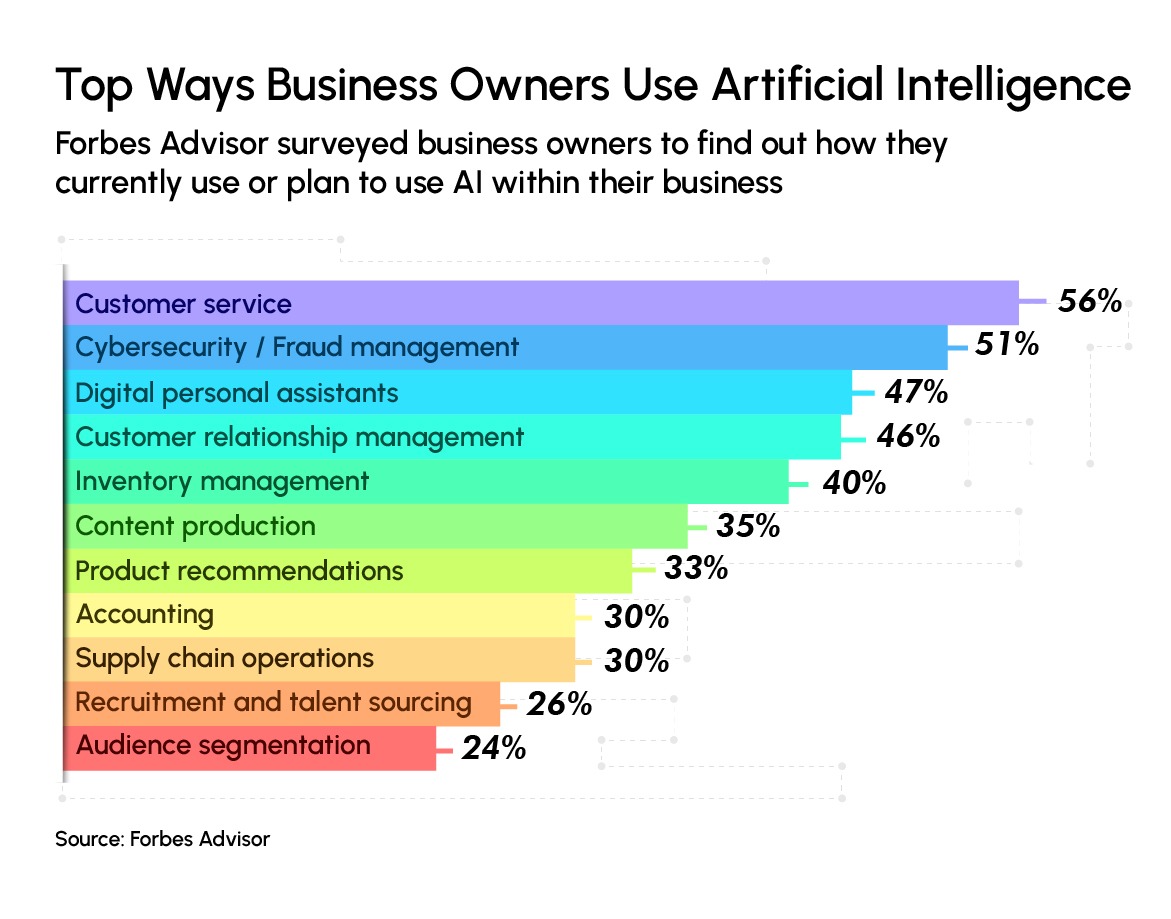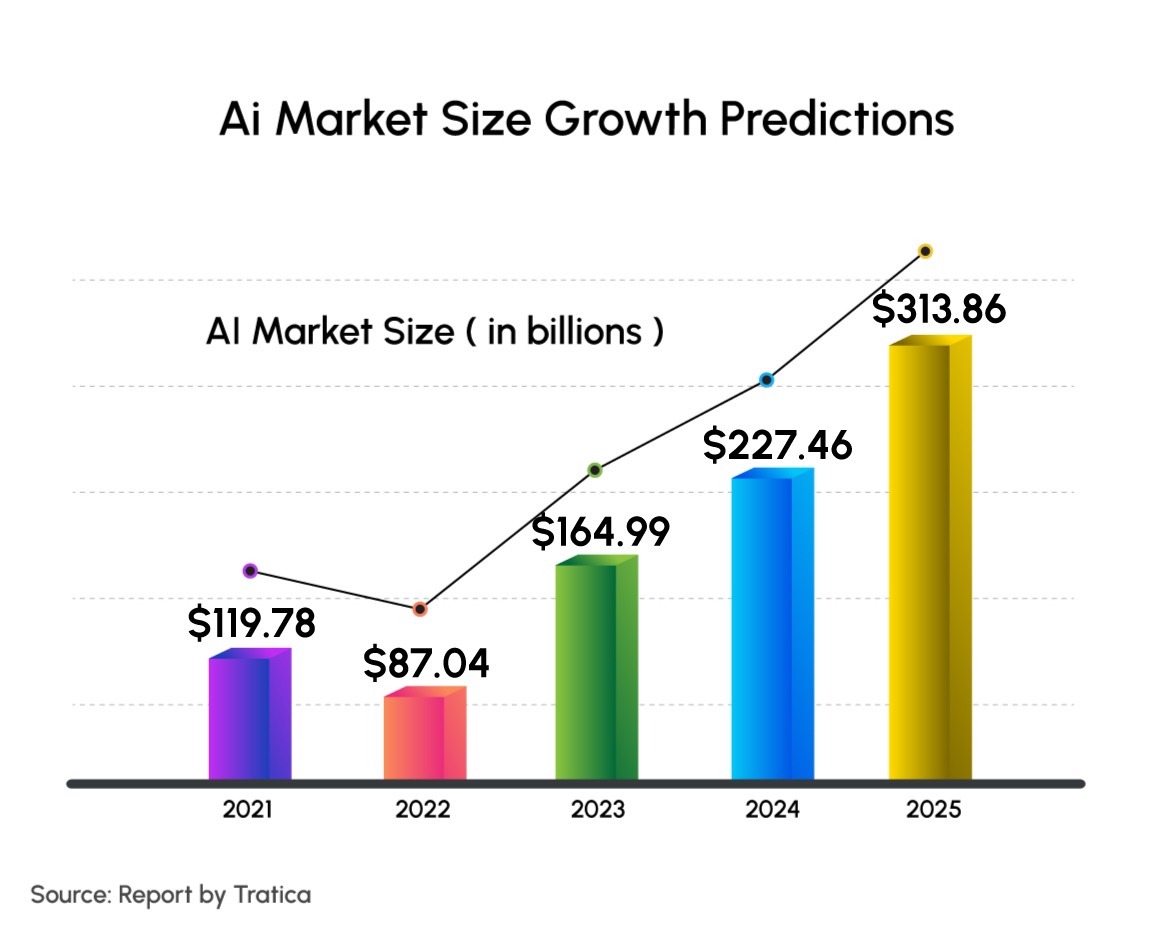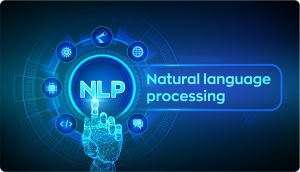
In the context of American businesses in 2023, the utilization of AI in business and applications of artificial intelligence stand as pivotal instruments for growth. This business era is defined by unprecedented data accessibility and shifting consumer preferences, rendering traditional methods obsolete.
Machine learning, strategically harnessed, offers profound insights from not just customer data but also internal processes, promising up to a 40% boost in productivity when integrated into operations. This is an expert view into AI’s transformation of American businesses, spotlighting its transformative applications and strategic significance in today’s dynamic market.
Statistical data supporting AI in Business Use Cases Across Industries
AI in business as a game changer is being used by leaders to transform various aspects of their operations. The key focus across these applications of artificial intelligence is workflow automation, which is streamlining tasks and enhancing decision-making, across the spectrum.
Companies are not utilizing AI tools to replace employees but to assist them in performing their jobs more efficiently and with reduced strain. This assistance spans tasks such as reviewing and summarizing data analysis evaluating documents, and facilitating employee collaboration on projects.
- In the retail industry, AI-powered personalized product recommendations to customers have demonstrated a remarkable potential to increase sales by up to 30%.
- According to a report by Accenture, the implementation of AI in manufacturing holds the promise of enhancing labor productivity by up to 27%.
- When integrated into EHR platforms, AI algorithms analyze extensive datasets from patients’ medical records and other sources, contributing significantly to the healthcare industry. For instance, it is helping doctors diagnose diseases more accurately based on historical data and develop more effective treatments.
- In the field of claims in insurance agriculture, the utilization of AI technology in drones equipped with sensors and cameras enables more efficient monitoring of crops and soil conditions than human efforts.
- In the energy sector, the application of machine learning algorithms to data generated from wind turbines has demonstrated the capability to increase energy production efficiency by up to 20%.
- According to a report from MarketsandMarkets, the global market for natural language processing (NLP) technology is expected to reach a substantial $35.1 billion by 2026. And that is just 3 years away. Generative AI which has got the recent spotlight with ChatGPT for business and Conversational AI models has made the applications of AI move in even more exciting directions than imagined.
Fifty-eight percent of industry leaders believe that Generative AI will create a personalized customer experience – Forbes Advisor survey of 600 business owners
- In the insurance industry, the implementation of predictive analytics powered by machine learning algorithms has enabled insurers to swiftly and accurately detect fraudulent claims, enhancing the efficiency of fraud detection processes.
- By employing sentiment analysis algorithms powered by AI technology, companies across various industries can harness insights from social media data to gain a deeper understanding of customer preferences and subsequently improve their marketing strategies.
- In the field of image recognition tasks, such as object detection and facial recognition, significant strides have been made thanks to computer vision algorithms powered by artificial neural networks, benefitting a wide range of industries.

Artificial Intelligence in Business Adoption is Showing a Steep Incline in Adoption
The report from Tratica shows that global AI adoption by businesses will grow by an astounding 259% in 2025 from 87 billion in 2021. Every business will have to get on the AI bandwagon either directly by automating their processes or by subscribing to processes that use AI tools.

Here are a few ways that we will see AI automation empower businesses
1. Supply Chain Optimization through AI
- AI Technology: Machine Learning for demand forecasting and route optimization.
- Impact on Business Workflows: AI technologies process vast amounts of data to predict demand accurately and optimize shipping routes, reducing costs and improving supply chain efficiency. This leads to streamlined supply chain workflows, reducing inventory management challenges.
- Future Outlook: AI automation in supply chains will play a pivotal role in making supply chains more resilient and adaptable to changing market dynamics, ensuring businesses remain competitive.
2. AI-Enhanced Healthcare and EHR Automation
- AI Technology: Natural Language Processing (NLP) and Machine Learning for Electronic Health Record (EHR) automation.
- Impact on Business Workflows: AI is automating EHR platforms through NLP and machine learning. It streamlines patient data entry, coding, and retrieval, reducing administrative burdens on healthcare professionals. This automation improves workflow efficiency and allows healthcare providers to focus more on patient care. Rehabone, the EHR proprietary software from iTech is powering small to large health care organizations in America.
- Future Outlook: EHR automation will continue to evolve, reducing paperwork, enhancing accuracy, and enabling more data-driven healthcare decisions.
3. Automation of CAD Data Extraction
- AI Technology: Computer Vision and Machine Learning for Computer-Aided Design (CAD) data extraction.
- Impact on Business Workflows: AI is automating the extraction of CAD data, accelerating the design and engineering processes. Computer vision algorithms can quickly parse CAD drawings, extract dimensions, and generate reports, significantly reducing manual effort. This leads to faster project completion and cost savings.
- Future Outlook: CAD data extraction AI automation will become increasingly sophisticated, further enhancing design and engineering workflows.
4. Applications of AI in Customer Support
- AI Technology: Natural Language Processing (NLP), Machine Learning, and Automation.
- Impact on Business Workflows: AI is transforming customer support by assisting human agents. NLP-powered chatbots and automation tools handle routine customer inquiries, leaving human agents to focus on more complex and value-added tasks. This improves the efficiency of customer support workflows.
- Future Outlook: Customer support specialists are embracing AI and automation tools such as ChatGPT for business, with 53% recognizing their importance. By 2024, 49% anticipate AI tools will independently handle most customer service-related tasks, allowing human agents to provide specialized assistance.
With these advancements, AI is reshaping various industries, optimizing workflows, and enabling humans to focus on higher-value tasks, ultimately improving productivity and customer satisfaction. Contact me for further insights into how we can help you automate your workflows.

Navin Kumar Parthiban
Navin Kumar Parthiban is a seasoned professional in the field of AI technologies and is a Director at iTech India. With a passion for innovation and a keen understanding of the ever-evolving landscape of artificial intelligence, Navin has played a pivotal role in driving iTech India’s success and technological advancements. Navin regularly shares his insights and knowledge through articles, seminars, and workshops. He believes in the power of AI to revolutionize industries and improve people’s lives, and he is dedicated to staying at the forefront of this rapidly evolving field.







